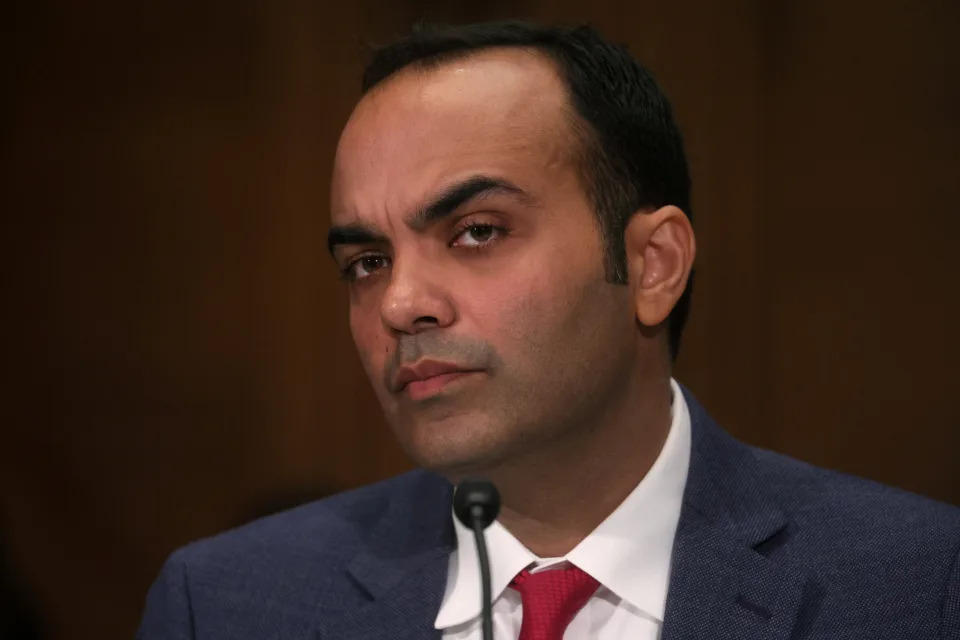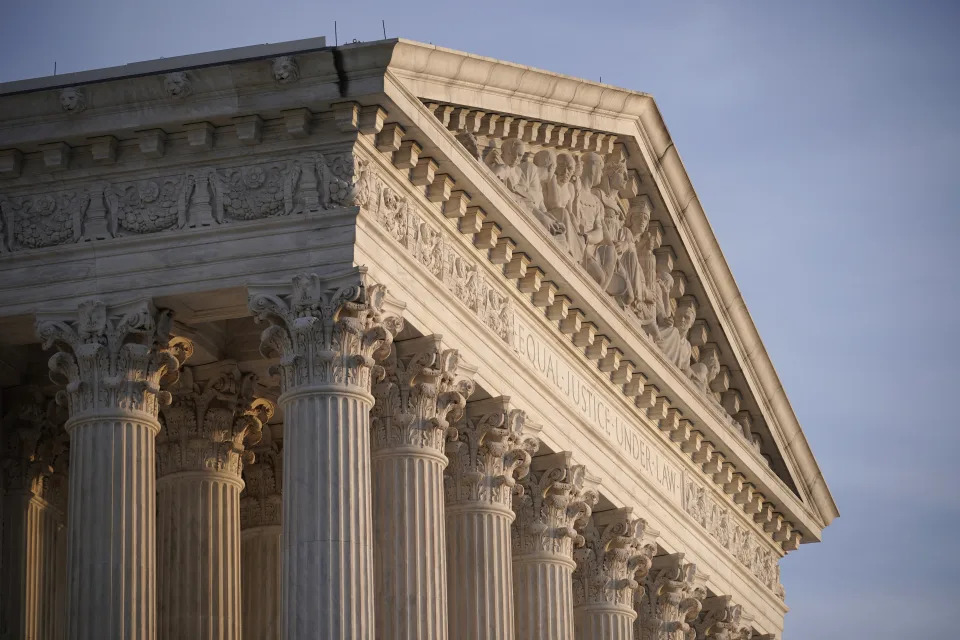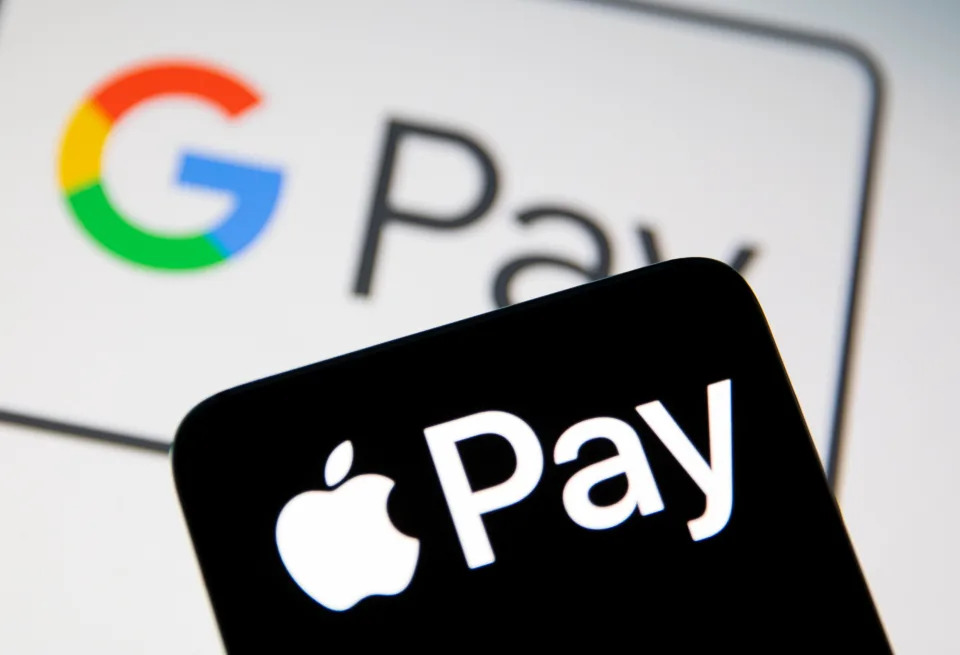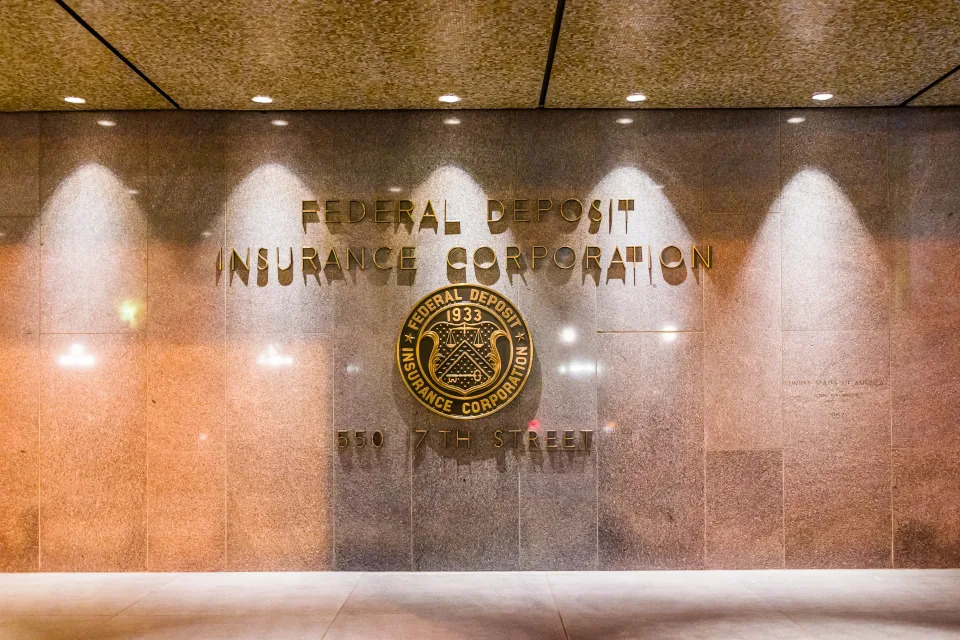Rohit Chopra: 'Financial markets are much better off with the CFPB'
US Consumer Financial Protection Bureau
Jennifer Schonberger
·Senior Reporter
Fri, October 6, 2023
Consumer Financial Protection Bureau Director Rohit Chopra said if an attempt to invalidate his agency's funding is successful before the Supreme Court, it would add more uncertainty for the mortgage industry and create "a lot of headaches" for consumers.
“I think the whole financial markets are much better off with the CFPB there,” Chopra told Yahoo Finance LIVE in an exclusive interview Friday. "I think if a CFPB had existed in the early 2000s, we wouldn't have had a subprime mortgage crisis."

US Consumer Financial Protection Bureau Director Rohit Chopra. (Leah Millis/REUTERS)
The interview with Chopra was his first since the Supreme Court heard oral arguments this week in a challenge to the funding structure of the CFPB, a financial regulator that was created by Sen. Elizabeth Warren (D-Mass.) in the aftermath of the subprime housing meltdown and financial crisis in 2008.
Payday lenders, who brought the challenge, have argued that the CFPB's funding that it receives through the Federal Reserve is unconstitutional and that funding should be appropriated by Congress.
The Supreme Court justices, however, appear likely to uphold that structure based on what transpired Tuesday, when some of them sounded skeptical of the arguments made by the payday lenders.

The Supreme Court building in Washington. (J. Scott Applewhite/AP Photo, File)
Chopra says even many mortgage lenders tell the agency how much they depend on clarity from the CFPB and the rules it put in place over the last decade.
"I think many in the mortgage industry are already facing so many challenges when it comes to the higher interest rate environment," Chopra said. "We see refinancing activity and loan origination activity go down and this would add even further uncertainty and really cause a lot of headaches for consumers too."
The case, he added, wouldn't stop the CFPB from its focus. "The business of the CFPB continues," he added.
'Lurching' toward China-style payments system
One main focus for the agency at the moment is ensuring the US payment system is safe and fair for consumers and not just conglomerates.
Chopra warned Friday that the US payment system is careening towards a Chinese-style system where Big Tech companies are taking advantage of blurring traditional lines drawn within the financial sector as they move into finance, threatening the separation between banking, money, and payments as well as the real economy.
"One of the things that I think we're seeing in the market is that the US is really lurching toward a market structure that's more like what we see in China," said Chopra.
"One that is fueled by a lot of surveillance and even censorship, one that actually mixes up banking payments with commercial activities. And we've had a long tradition in our country of trying to separate from the real economy so that they're supporting other businesses, not steering to those businesses."
Chopra said the CFPB is looking at appropriate authorities to use to conduct supervisory examinations of nonbanks that are operating consumer payment platforms, essentially tech firms.
"We have a number of authorities to do so, such as when these firms serve as service providers to large depository institutions," he said. "Another one of these authorities includes defining larger participants in this market, by rule, which would subject nonbanks meeting a particular size threshold to CFPB supervision."
Chopra says the agency plans to issue supplemental orders to certain large technology companies to get more information to help the CFPB better understand their business practices, especially when it comes to the use of sensitive personal data and any issuance of private currencies.
The CFPB released a report last month that found that Apple and Google are acting as “choke points” to the US payment system, cutting off innovation by keeping other apps out.

The CFPB said last month that Apple and Google are acting as "choke points" to the US payment system. (Dado Ruvic/REUTERS/Illustration
"It's worrisome when we don't have a real open and decentralized system that consumers and businesses and new types of startups in the financial sector can all use to get ahead," said Chopra. "So we're going to be continuing to look really carefully at how that data harvesting and surveillance is working."
Chopra also said regulators need to make sure the consumer payment firms are not trafficking fraud and find ways to restrict how some of the payments firms can harvest surveil and monetize Americans’ personal data.
Later this month, Chopra said the agency will propose new rules around open banking and personal financial data rights.
"[We want] Americans to have confidence when they share their financial data that those companies aren't reselling it or trafficking it for purposes that the consumer never even wanted," said Chopra.
Chopra says the CFPB is also closely looking at currencies being issued by Big Tech firms. He said all regulators are going to take a close look at a coming stablecoin from PayPal.
"Paypal, which operates Venmo, has had a number of run-ins with the law when it comes to compliance with consumer protection and privacy laws. So obviously, it's going to require a close look from all the regulators."
'I've never met a single banker that ever wanted to hold more capital'
Chopra also sits on the board of the Federal Deposit Insurance Corporation, which is among the regulators that recently proposed new capital requirements for banks.
The banks vehemently oppose the proposal, arguing higher capital requirements could hurt credit availability in the US and push banking into unregulated areas like the shadow banking system.
Asked whether regulators would consider softening in any areas of the proposal, Chopra cited the massive bailouts of banks that followed the financial crisis of 2008.

The FDIC building in Washington. (Getty Images)
“I don't think we can have a system where banks and bank executives can roll the dice where they get all the winnings, but then taxpayers and our economy are holding the bag when their bets go badly. We've got to make sure that if they are taking insured deposits that they have some real skin in the game.”
Chopra said regulators are taking public feedback on the rules before finalizing them.
"I have never met a single banker that ever wanted to hold more capital," he said. "So it's no surprise that they will not want to do this. But we've got to think of our country and the economy too."
Jennifer Schonberger
·Senior Reporter
Fri, October 6, 2023
Consumer Financial Protection Bureau Director Rohit Chopra said if an attempt to invalidate his agency's funding is successful before the Supreme Court, it would add more uncertainty for the mortgage industry and create "a lot of headaches" for consumers.
“I think the whole financial markets are much better off with the CFPB there,” Chopra told Yahoo Finance LIVE in an exclusive interview Friday. "I think if a CFPB had existed in the early 2000s, we wouldn't have had a subprime mortgage crisis."
US Consumer Financial Protection Bureau Director Rohit Chopra. (Leah Millis/REUTERS)
The interview with Chopra was his first since the Supreme Court heard oral arguments this week in a challenge to the funding structure of the CFPB, a financial regulator that was created by Sen. Elizabeth Warren (D-Mass.) in the aftermath of the subprime housing meltdown and financial crisis in 2008.
Payday lenders, who brought the challenge, have argued that the CFPB's funding that it receives through the Federal Reserve is unconstitutional and that funding should be appropriated by Congress.
The Supreme Court justices, however, appear likely to uphold that structure based on what transpired Tuesday, when some of them sounded skeptical of the arguments made by the payday lenders.
The Supreme Court building in Washington. (J. Scott Applewhite/AP Photo, File)
Chopra says even many mortgage lenders tell the agency how much they depend on clarity from the CFPB and the rules it put in place over the last decade.
"I think many in the mortgage industry are already facing so many challenges when it comes to the higher interest rate environment," Chopra said. "We see refinancing activity and loan origination activity go down and this would add even further uncertainty and really cause a lot of headaches for consumers too."
The case, he added, wouldn't stop the CFPB from its focus. "The business of the CFPB continues," he added.
'Lurching' toward China-style payments system
One main focus for the agency at the moment is ensuring the US payment system is safe and fair for consumers and not just conglomerates.
Chopra warned Friday that the US payment system is careening towards a Chinese-style system where Big Tech companies are taking advantage of blurring traditional lines drawn within the financial sector as they move into finance, threatening the separation between banking, money, and payments as well as the real economy.
"One of the things that I think we're seeing in the market is that the US is really lurching toward a market structure that's more like what we see in China," said Chopra.
"One that is fueled by a lot of surveillance and even censorship, one that actually mixes up banking payments with commercial activities. And we've had a long tradition in our country of trying to separate from the real economy so that they're supporting other businesses, not steering to those businesses."
Chopra said the CFPB is looking at appropriate authorities to use to conduct supervisory examinations of nonbanks that are operating consumer payment platforms, essentially tech firms.
"We have a number of authorities to do so, such as when these firms serve as service providers to large depository institutions," he said. "Another one of these authorities includes defining larger participants in this market, by rule, which would subject nonbanks meeting a particular size threshold to CFPB supervision."
Chopra says the agency plans to issue supplemental orders to certain large technology companies to get more information to help the CFPB better understand their business practices, especially when it comes to the use of sensitive personal data and any issuance of private currencies.
The CFPB released a report last month that found that Apple and Google are acting as “choke points” to the US payment system, cutting off innovation by keeping other apps out.
The CFPB said last month that Apple and Google are acting as "choke points" to the US payment system. (Dado Ruvic/REUTERS/Illustration
"It's worrisome when we don't have a real open and decentralized system that consumers and businesses and new types of startups in the financial sector can all use to get ahead," said Chopra. "So we're going to be continuing to look really carefully at how that data harvesting and surveillance is working."
Chopra also said regulators need to make sure the consumer payment firms are not trafficking fraud and find ways to restrict how some of the payments firms can harvest surveil and monetize Americans’ personal data.
Later this month, Chopra said the agency will propose new rules around open banking and personal financial data rights.
"[We want] Americans to have confidence when they share their financial data that those companies aren't reselling it or trafficking it for purposes that the consumer never even wanted," said Chopra.
Chopra says the CFPB is also closely looking at currencies being issued by Big Tech firms. He said all regulators are going to take a close look at a coming stablecoin from PayPal.
"Paypal, which operates Venmo, has had a number of run-ins with the law when it comes to compliance with consumer protection and privacy laws. So obviously, it's going to require a close look from all the regulators."
'I've never met a single banker that ever wanted to hold more capital'
Chopra also sits on the board of the Federal Deposit Insurance Corporation, which is among the regulators that recently proposed new capital requirements for banks.
The banks vehemently oppose the proposal, arguing higher capital requirements could hurt credit availability in the US and push banking into unregulated areas like the shadow banking system.
Asked whether regulators would consider softening in any areas of the proposal, Chopra cited the massive bailouts of banks that followed the financial crisis of 2008.
The FDIC building in Washington. (Getty Images)
“I don't think we can have a system where banks and bank executives can roll the dice where they get all the winnings, but then taxpayers and our economy are holding the bag when their bets go badly. We've got to make sure that if they are taking insured deposits that they have some real skin in the game.”
Chopra said regulators are taking public feedback on the rules before finalizing them.
"I have never met a single banker that ever wanted to hold more capital," he said. "So it's no surprise that they will not want to do this. But we've got to think of our country and the economy too."
No comments:
Post a Comment